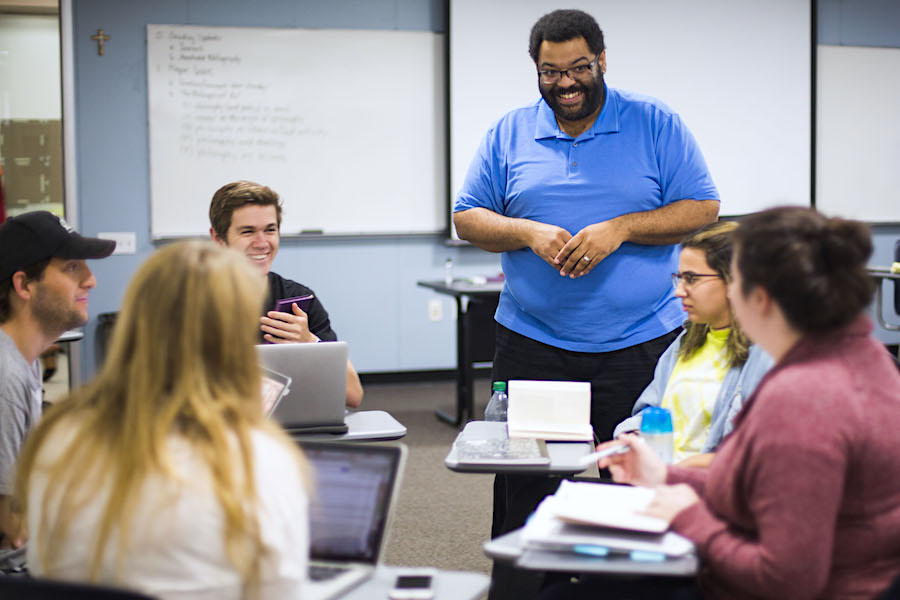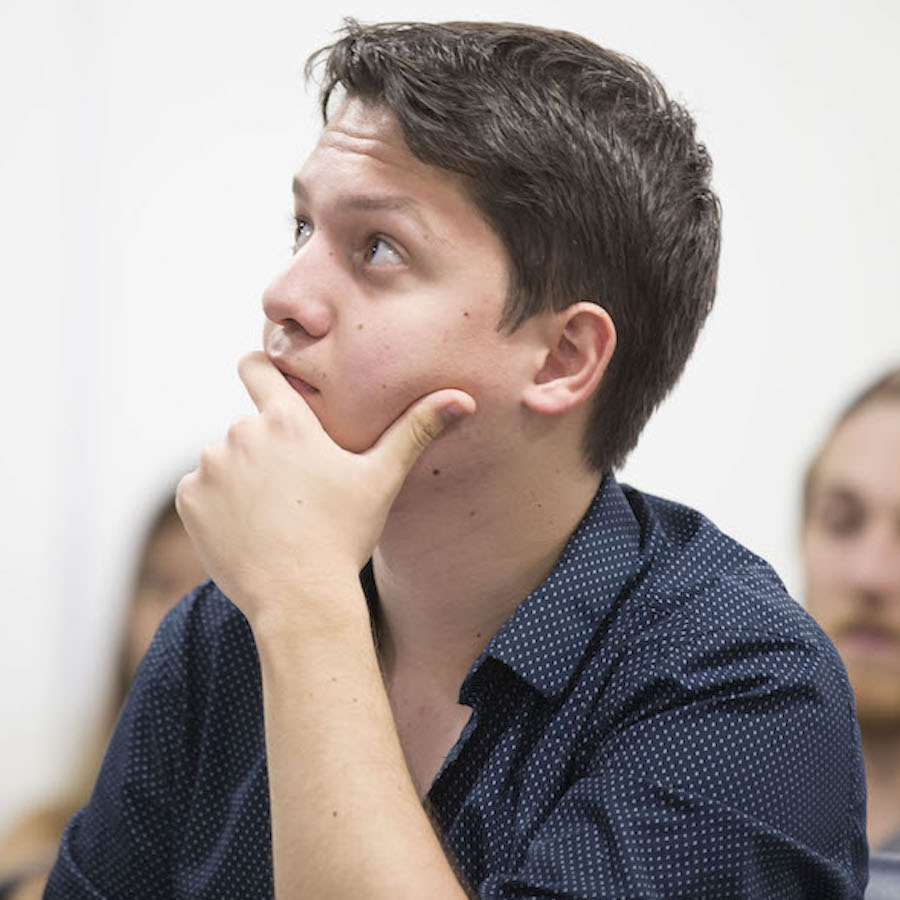
Graduate Program in Philosophy
Loyola Marymount University’s M.A. Program in Philosophy provides an opportunity for students to acquire a solid grasp of the history of philosophy, both Western and Eastern, and to pursue specialized studies of a range of philosophical issues and major figures. Our program is designed for students who seek the comprehensive background and training required for admission to and success in a Ph.D. program in Philosophy, as well as for those who wish to complement their studies in related disciplines with the Master of Arts in Philosophy.
APPLY NOWOverview

Our students are invited to acquire a solid grasp of the history of philosophy and to pursue specialized studies of a range philosophical issues and figures. The program is designed for students who seek the comprehensive background and training required for admission to and success in a Ph.D. program in Philosophy, as well as for those who wish to complement their studies in related disciplines with the Master of Arts in Philosophy.
Special features of our M.A. Program are our commitment to imparting to students the skills associated with effective teaching as they broaden and deepen their philosophical understanding and our commitment to promoting our students' professional development in preparation for a career in the field of Philosophy.
The program is marked by four signature strengths:
- The History of Philosophy
- Contemporary Continental Philosophy
- The Philosophy of Virtue and Responsibility
- Philosophy in the Catholic and Jesuit Tradition
Degree Requirements
-
Program Requirements
- 30 graduate units of course work (10 courses, plus the Area Examination), which must include:
- Graduate Proseminar, which must be taken in the student's first fall semester in the program
- Area Examination (0 units), which must be taken in the student's final semester in the program
- At least three courses in one of the following program areas:
- Classical Metaphysics
- Contemporary Continental Philosophy
- Virtue, Freedom, and Responsibility
- Comparative and Global Philosophy
- Students may fulfill at most six units of these requirements by graduate course work in the Departments of English, Theological Studies, Bioethics, or Yoga Studies (namely pertaining to the comparative and global philosophy area, e.g. Indian Philosophy)
- Demonstrated reading proficiency in one of the following philosophical research languages, or a different language by justified request (usually pertaining to a specific research topic or theme that the student will use in further graduate work):
- Chinese
- French
- German
- Greek
- Latin
- Successful completion of the Area Examination. The student will submit an essay (either written for a course or an essay written for independent study) which will serve as a starting point to a greater philosophical examination in the area. Reading lists will be determined by the faculty teaching in the program area. Students are expected to clearly articulate the positions presented by the works of the reading list and have their own philosophical positions on the topics discussed.
- Students must maintain a 2.0 GPA to remain in good standing in the program and to continue to receive program-funded financial aid
What We Suggest
- Students usually take the following distribution of courses:
- Year One: Three courses per semester
- Fall: Proseminar, plus two courses
- Spring: Three courses (for students participating in TOP, the TOP course counts as one of these three)
- Year Two: Two courses per semester (due to TOP teaching, Ph.D. applications, and program examinations)
- Fall: Two courses
- Spring: Two courses, plus the zero-unit Area Examination
- We strongly encourage students to participate in the Teacher Orientation and Practicum.
- We strongly encourage students to avoid taking incompletes except in the case of true emergency.
Learning Outcomes

Upon successful completion of the M.A. Program in Philosophy, graduates will:
- be familiar with the major figures, movements, positions, and issues characterizing the ancient, medieval, modern, late modern, and contemporary periods in the history of Western Philosophy;
- be able to make intelligent and critical use of the resources and tools required for thorough philosophical research and writing;
- be able to interpret philosophical texts intelligently, critically, and charitably;
- be able to analyze and evaluate philosophical arguments;
- be capable of clear, coherent, and rigorous argumentation and expression in their own philosophical writing;
- be able to communicate their interpretations of philosophical texts and their own critical views confidently in both informal and professional settings;
- be able to engage in fruitful philosophical dialogue and discussion;
- be able to formulate precisely and communicate clearly their own developing positions on the basic epistemological, metaphysical, and ethical questions;
- have a clearer understanding and firmer grasp of the philosophical questions with which they themselves are most deeply concerned;
- be familiar with the range of responsibilities associated with the professional side of the philosophical life.
Teacher Orientation Practicum
The aim of the Teacher Orientation and Practicum (TOP) is to introduce students to the practical and pedagogical tasks involved in teaching at the undergraduate level, and to provide basic instruction in the effective performance of those tasks. TOP is administered by the TOP Coordinator who is a faculty member in the Department of Philosophy. It includes both instructional sessions and practical applications.
The instructional sessions provide guide-lines for the preparation of course descriptions and syllabi, assignments and examinations, and for the grading of assignments and examinations. In addition, they offer instruction in the ethics of the profession, and guidelines for the preparation and delivery of lectures and the conduct of classroom discussions.
The practical applications include: interviews with faculty members about their approaches to teaching and their methods, their successes and their failures; preparation of sample course descriptions and syllabi; preparation and delivery of one guest lecture in a lower-division Philosophy course, student evaluations, and a final review of the student's performance.
Ongoing assistance is provided by experienced, full-time members in the Department of Philosophy.
Students who choose to participate in TOP do so during their second and third semesters of the M.A. Program, unless they enter the program at mid-year. Students who participate in TOP are eligible to apply for positions as Teaching Fellows in the Department of Philosophy.
The TOP Coordinator is Dr. Josh Mason.
How to Apply
Applicants to the program must provide the following:
- Demonstration of Competence in Philosophical Study
- Two letters of recommendation
- A Personal Statement of intent
- A Writing Sample
See below for details.
Submit all application materials using LMU's online application.
If you have any questions, please contact:
Daniel Speak
Graduate Program Director
310.338.1792
Daniel.Speak@lmu.edu
University Hall 3745
Priority deadline for the receipt of all materials
- Fall Semester Entry: March 15th
- Spring Semester Entry: November 1st
- Applications are accepted after these deadlines, but financial aid monies might no longer be available. Students admitted without financial aid at entry are eligible for financial aid the following year.
-
- Demonstration of Competence in Philosophical Study through:
- Completion of undergraduate major or minor in Philosophy
- Strong undergraduate preparation in a closely related field
- The competency of students with non-traditional backgrounds will be determined in interviews with the Program Director
- The average GPA of students entering our program is 3.5 or higher
- Two letters of recommendation
- A Personal Statement of intent
- No more than four typed pages
- Applicants are expected to indicate why they wish to pursue philosophical studies at the graduate level and what their career plans are
- A Writing Sample
- 10-20 pages in length.
- Preferably of philosophical writing.
-
There is financial aid available for every student enrolled in the program. Good standing is required for continuation of program-funded financial aid. None of these categories preclude the others: it is possible for a graduate student to simultaneously have a Graduate Grant, a Philosophy Teaching Fellowship, and a Graduate Student Assistantship. Together these elements form a competitive financial aid package for our applicants.
LMU Financial Aid Office
- For information visit LMU Financial Aid
- For personal consultation with an LMU Graduate Financial Aid Counselor, call 310.338.6086.
Philosophy Graduate Grants
- The Philosophy M.A. Program awards all incoming students who met the priority admission application deadline with a Graduate Grant ranging from $5000 to $9000 per year (depending on admissions criteria and availability). These grants are directly applied to the tuition bill.
Philosophy Teaching Fellowships
- Students who take the Teaching Orientation and Practicum course in the Spring semester of their first year are eligible to become Philosophy Teaching Fellows in the second year. These fellowships add an additional $5000 of funding for the second year. Fellowships are paid biweekly; they are not automatically applied to one's tuition bill. Philosophy Teaching Fellowships are in addition to the Graduate Grant.
Graduate Student Assistantships
- The Philosophy M.A. Program has three $13, 000/year Graduate Student Assistantships (two from the Graduate Program, one from the Los Angeles Lonergan Center). These assistantships are renewed upon good standing in the program. The GSAs for the Graduate Program work with the Graduate Director in running the program and also serve as the coordinators of the Graduate Philosophical Society and its events. Assistantships are paid biweekly; they are not automatically applied to one's tuition bill. Every Philosophy M.A. Program GSA is in addition to the Graduate Grant.
- Other departments and offices throughout the university have Graduate Student Assistantships that Philosophy students can obtain. They are also around $13, 000 per year.
- Students can only have one GSA at any given time, regardless of who is offering them.
Other Grants and Scholarships
- A student might be eligible for additional grants and scholarships connected to the University, private groups, U.S. Military service, etc. Please discuss these matters with an LMU Graduate Financial Aid Counselor or with the Program Director.